1. Introduction to Mediterranean Cuisine
Mediterranean cuisine is more than just a collection of dishes; it’s a culinary tradition that spans thousands of years and many cultures. Rooted in the lands surrounding the Mediterranean Sea, this cuisine has significantly influenced global gastronomy.
From the fragrant herbs of Greece to the rich spices of Morocco, Mediterranean food is renowned for its vibrant flavors, diverse ingredients, and health benefits.
But lets delve into what is considered Mediterranean food and what what make it unique worldwide.
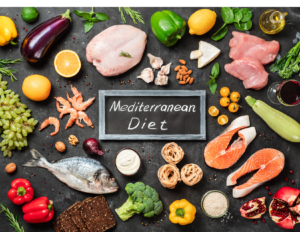
Read More: How Fast Can You Lose Weight on the Carnivore Diet?
2. Core Ingredients
At the heart of Mediterranean cuisine are key ingredients defining its flavor profile and nutritional value. These ingredients are celebrated for their culinary versatility and health benefits.
a. Olive Oil
Often referred to as “liquid gold,” olive oil is a staple in Mediterranean cooking. Rich in monounsaturated fats and antioxidants, it is used in everything from salad dressings to sautéing vegetables.
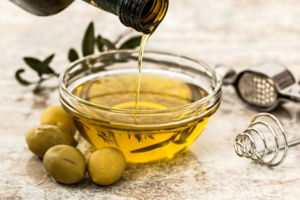
b. Fresh Vegetables and Fruits
Mediterranean dishes are abundant in fresh produce, including tomatoes, cucumbers, bell peppers, and leafy greens. These vegetables are delicious and packed with essential vitamins and minerals.

c. Whole Grains
Whole grains like bulgur, farro, and whole wheat are common in Mediterranean diets. They provide a good source of fiber and help maintain energy levels throughout the day.

d. Legumes
Beans, lentils, and chickpeas are often used in Mediterranean cooking. They offer plant-based protein and a variety of nutrients.
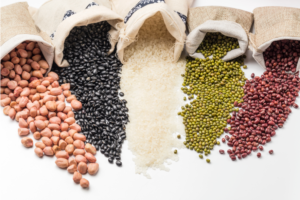
e. Fish and Seafood
Fish like salmon, mackerel, and sardines are frequently featured in Mediterranean cuisine, and they are rich in omega-3 fatty acids, which are beneficial for heart health.
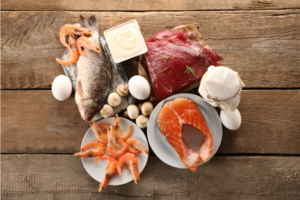
f. Herbs and Spices
Herbs such as oregano, basil, rosemary, and spices like cumin and coriander add depth and complexity to Mediterranean dishes without excessive salt or fat.
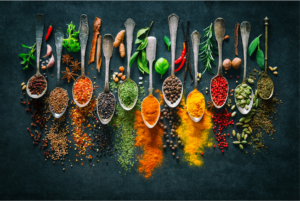
3. Regional Variations
The Mediterranean region encompasses various culinary traditions, each with its unique take on shared ingredients.
a. Italy
Italian cuisine emphasizes simplicity and quality. Essential dishes include pasta with fresh tomato sauce, risotto, and the ever-popular pizza. Olive oil, garlic, and basil are frequently used to enhance flavors.
b. Greece
Greek cuisine is known for its use of olive oil, fresh herbs, and grilled meats. Signature dishes include moussaka, souvlaki, and spanakopita, often accompanied by a side of tzatziki.
c. Spain
Spanish cuisine boasts a variety of flavors, from the rich and savory paella to the refreshing gazpacho. Tapas, small dishes meant for sharing, are a cultural staple.
d. Morocco
Moroccan cuisine is a fusion of Arab, Berber, and Mediterranean influences. It is prevalently spiced with saffron, cinnamon, and cumin. Couscous, tagines, and pastillas are traditional Moroccan delights.
4. What made the Mediterranean so rich?
The Mediterranean region’s richness can be attributed to its geographical diversity, historical trading routes, and the blending of various cultures over millennia.
The area has always been a melting pot of civilizations, encompassing parts of three continents—Europe, Asia, and Africa—each contributing unique elements to the culinary tapestry.
Fertile lands and a temperate climate have fostered the growth of diverse agricultural products, from olive groves in Italy to vineyards in Spain.
The historical significance of trade routes such as the Silk Road and maritime links enabled the exchange of spices, herbs, and cooking techniques, enhancing the culinary repertoire.
This confluence of geography, history, and culture culminates in a vibrant, rich cuisine that reflects the best of what the land and its people have to offer.
Read More: What is a Carb Consistent Diet?
5. What characterizes Mediterranean cuisine?
a. Characteristic Flavors and Cooking Techniques
Mediterranean cuisine is distinguished by its characteristic flavors and cooking techniques, which emphasize simplicity, freshness, and healthfulness. The cuisine relies on a few foundational elements that combine to create dishes that are both flavorful and nutrient-dense.
i. Simplicity and Freshness
The hallmark of Mediterranean cuisine is its simplicity. Dishes often feature a handful of fresh, high-quality ingredients prepared in ways that enhance their natural flavors. Whether it’s drizzling olive oil over-ripe tomatoes or grilling fresh fish with a squeeze of lemon, the focus is on letting the ingredients shine.
ii. Seasonal and Local Ingredients
Another defining feature of Mediterranean cooking is the use of seasonal and locally sourced ingredients. This not only ensures the freshness of the produce but also supports local farmers and economies. Seasonal eating means enjoying fruits and vegetables at their peak ripeness, contributing to the vibrant flavors that Mediterranean dishes are known for.
iii. Use of Healthy Fats
Replacing saturated fats with healthier options is intrinsic to Mediterranean cuisine. Olive oil is the primary fat used for cooking and dressing, praised for its monounsaturated fats and anti-inflammatory properties. Nuts and seeds also add healthy fats and crunch to various dishes.
iv. Traditional Cooking Methods
Grilling, roasting, and slow-cooking are traditional methods that bring out the best in Mediterranean ingredients. Grilling imparts a smoky flavor to meats and vegetables while roasting and slow-cooking help concentrate flavors and create tender textures. These methods are not just about taste but also about preserving the nutritional value of the foods.
b. Health Benefits
Mediterranean cuisine is lauded for its health benefits, contributing to its status as a model of healthy eating.
i. Cardiovascular Health
Studies have consistently shown that a Mediterranean diet can reduce the risk of heart disease. This is attributed to the high intake of fruits, vegetables, whole grains, healthy fats, moderate consumption of fish and poultry, and minimal intake of red meat and sweets.
ii. Weight Management
The balanced approach to macronutrients and the emphasis on portion control and mindful eating help maintain a healthy weight. The diet’s richness in fiber from whole grains, fruits, and vegetables aids in satiety and digestion.
iii. Anti-inflammatory and Antioxidant Properties
The abundance of fruits, vegetables, nuts, and olive oil provides a wealth of antioxidants and anti-inflammatory compounds. These properties reduce inflammation and oxidative stress in the body, which are linked to various chronic diseases.
iv. Longevity
Communities that adhere to traditional Mediterranean diets, such as those in the Greek islands and parts of Italy, often report higher than average life expectancies. This dietary pattern, an active lifestyle, and strong social connections play a role in promoting longevity.
5. Cultural Significance
Mediterranean cuisine is more than just food; it reflects the region’s lifestyle, values, and traditions. Meals are often a communal experience, bringing together family and friends to share food, stories, and experiences.
Yotam Ottolenghi, a celebrated chef known for his Mediterranean-inspired dishes, emphasizes, “The Mediterranean way of eating is about enjoying food in the company of others, celebrating the diversity and richness of the ingredients.”
Read More: What is 80/10/10 Diet? A Comprehensive Guide
6. Making Mediterranean at Home
Incorporating Mediterranean flavors into your daily meals is simpler than you might think. Here are some practical tips and easy recipes to get started:
a. Simple Mediterranean Salad
i. Ingredients:
- Fresh tomatoes, cucumbers, and bell peppers
- Kalamata olives
- Feta cheese
- Olive oil and lemon juice dressing
- Oregano and basil
ii. Instructions:
- Chop the vegetables and combine them in a bowl.
- Add the olives and crumbled feta cheese.
- Drizzle with olive oil and lemon juice.
- Sprinkle with oregano and basil. Toss and serve.
b. Grilled Chicken with Tzatziki
i. Ingredients:
- Chicken breasts
- Olive oil, garlic, and lemon juice marinade
- Greek yogurt
- Cucumber and dill for tzatziki
ii. Instructions:
- Marinate the chicken breasts in olive oil, garlic, and lemon juice for at least 30 minutes.
- Grill the chicken until fully cooked.
- For the tzatziki, mix Greek yogurt with grated cucumber and chopped dill.
- Serve the grilled chicken with a side of tzatziki.
7. The Future of Mediterranean Cuisine
As the world becomes more interconnected, Mediterranean cuisine continues to evolve, blending traditional techniques with modern innovations.
Samin Nosrat, author of “Salt, Fat, Acid, Heat,” notes, “Mediterranean food is timeless, yet it constantly adapts, embracing new ingredients and cooking methods while staying true to its roots.”
a. Trends and Innovations
- Sustainable Sourcing: There is a growing emphasis on sustainable and locally sourced ingredients in Mediterranean cooking.
- Plant-Based Alternatives: With the rise of plant-based diets, Mediterranean cuisine incorporates more vegetarian and vegan options.
- Fusion Dishes: Chefs are experimenting with fusing Mediterranean flavors with other culinary traditions, creating exciting new dishes.
8. Conclusion
The richness and diversity of Mediterranean food offer more than just delightful flavors; they provide a pathway to a healthier, more fulfilling lifestyle.
Whether you’re a food enthusiast, a health-conscious eater, or someone who loves exploring different cultures, Mediterranean food has something to offer.
